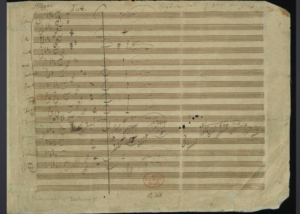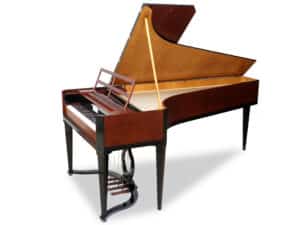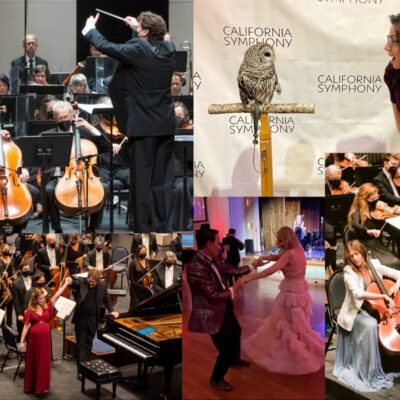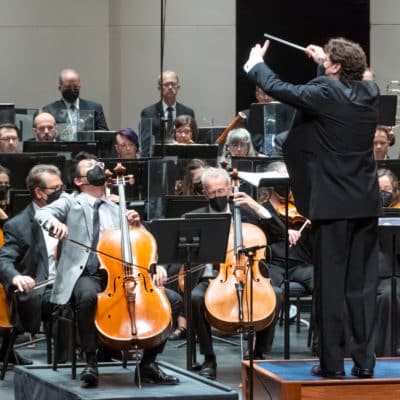
A fragment of the 1809 manuscript for Emperor.
Beethoven’s fifth piano concerto is one of the best known and best loved pieces of music ever written, but it wasn’t always known as the “Emperor” and Beethoven might have had some choice words about its nickname.
- What’s in a name? Beethoven did not give his fifth piano concerto the nickname “Emperor” and he would almost certainly have disapproved of the title. By 1809 as Beethoven was composing the piece, Austria was under bombardment by Napoleon’s forces, and Napoleon had crowned himself emperor, betraying the revolutionary ideals that had once caught the imagination of the composer. It was at this time that Beethoven had to go and live with his brother Caspar in Vienna, where he hid in the basement, pillows pressed to his ears, to preserve what little hearing he had left at that point. He complained the experience “Has affected me body and soul… with nothing but drums, cannons, men, misery of all sorts.”
- Beethoven, the acclaimed pianist? When he arrived in Vienna, Beethoven was known first and foremost as a virtuosic pianist. Five of the seven concertos Beethoven wrote were for piano, though the instrument would have looked and sounded quite different from today’s grand concert pianos. Soon before he died, Beethoven opined that “the piano is and remains an inadequate instrument” wishing it was larger and louder to withstand the rigors of his playing style—and so he could hear it.

1811: The Fritz piano had a range of six octaves.
- He knew what he wanted—and what he didn’t want The Emperor is the final piano concerto Beethoven ever wrote and the only one he never performed in public, because his hearing was too far gone. The soloist who premiered the work was on a short leash as Beethoven vetoed the possibility of an improvised passage, writing on the score: “Do not play a cadenza, but begin immediately what follows.” He then wrote in the score every note he wanted to be played.
- Pleasing audiences for more than 200 years Emperor is a perennial favorite and regularly ranks in the top ten of popular classical music polls. A contemporary reviewer wrote “It is without doubt one of the most original, imaginative, most effective but also one of the most difficult of all existing concertos… the crowded audience was soon put into such a state of enthusiasm that it could hardly content itself with the ordinary expressions of recognition and enjoyment.”
- Emperor and the movies Beethoven’s music features in many film soundtracks and the slow, quieter, second movement has been used to set the mood in movies including “The King’s Speech” (2010) and “Dead Poet’s Society” (1989). What’s notable about this movement is that that orchestra plays the closest thing to a melody while the piano weaves notes around it.
Serene. Beautiful. Brilliant. Here’s how Arthur Rubinstein played it.
The California Symphony’s 2021-22 season opener Emperor featuring Adam Golka takes place Saturday, Sept. 18 at 7:30 PM and Sunday, Sept. 19 at 4 PM at the Lesher Center for the Arts. Tickets are $44 to $74 and subscription packages of 3 or more concerts start at $33 per concert. Buy tickets online or call or visit the Lesher Center Ticket Office at 925.943.7469, Wed – Sun, 12:00 noon to 6:00 pm.



